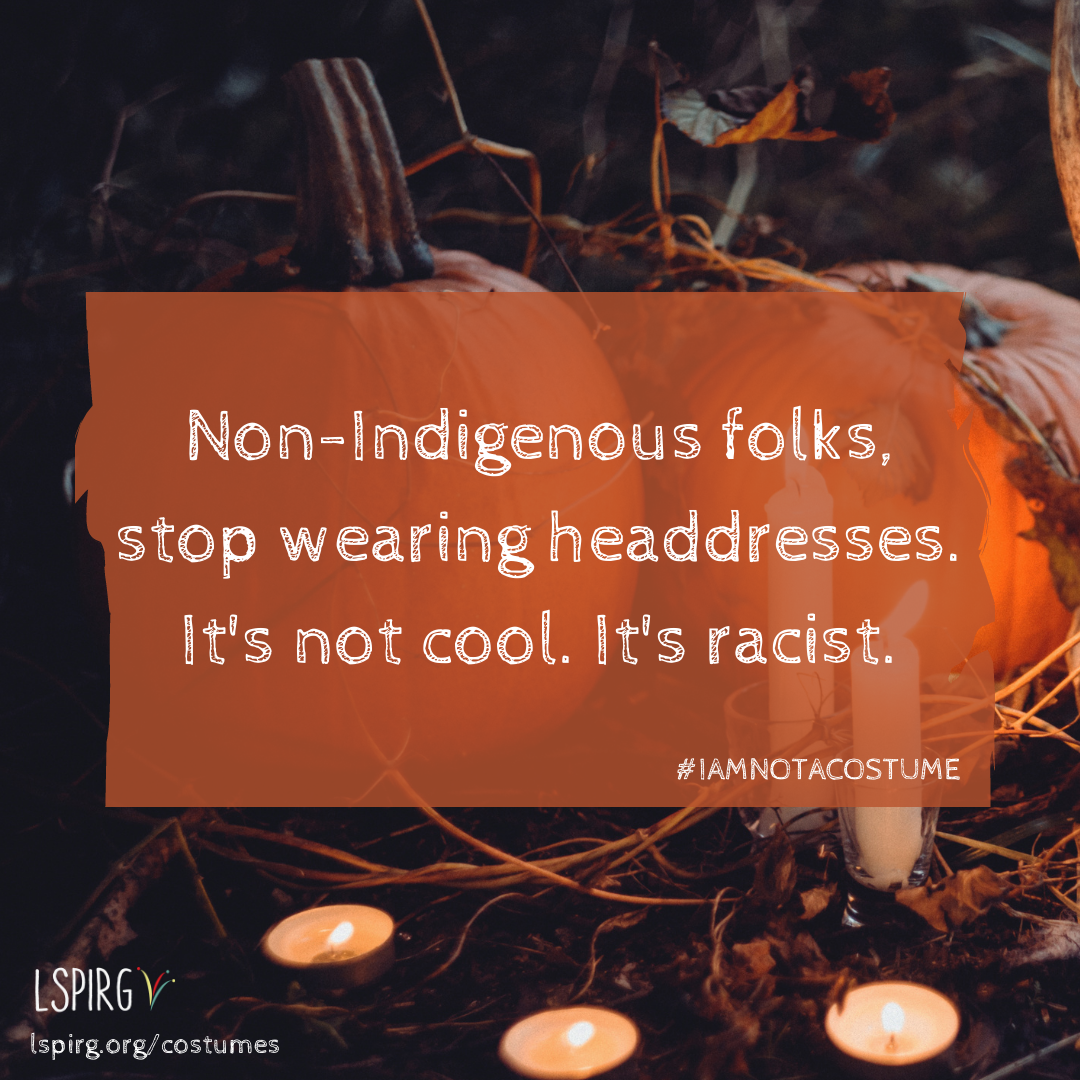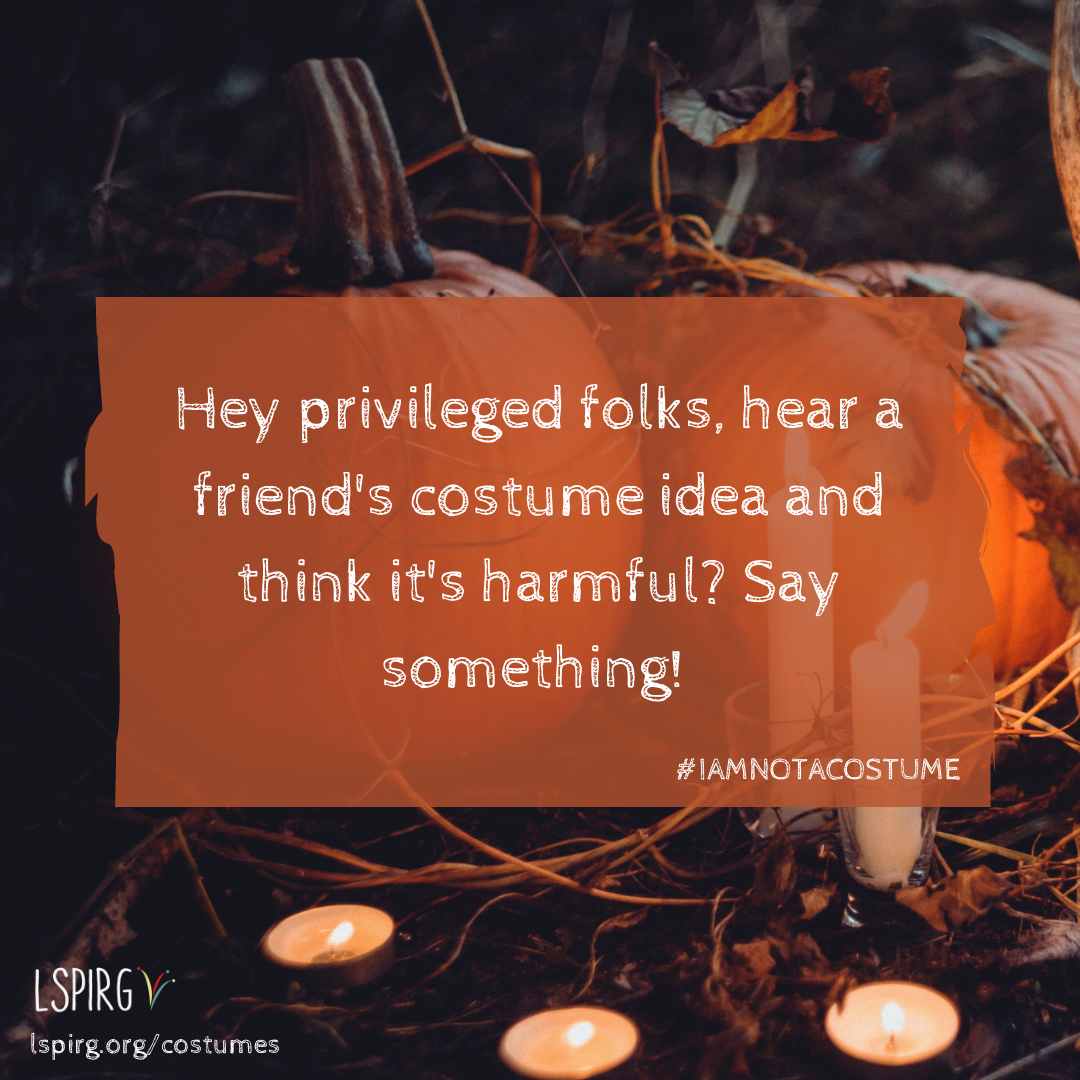#IAmNotACostume
LSPIRG's #IAmNotACostume campaign aims to draw awareness to the problematic nature of some Halloween costumes. We know that most folks do not pick out a costume with the intention of being racist or transphobic. But regardless of intentions, appropriative costumes still perpetuate harmful stereotypes and contribute to the continuation of the violence and aggression towards marginalized folks.
HOW IS THIS POSSIBLE?
Good question! It’s possible because racism, transphobia, and ableism are all engrained in our history and present society. This has been built through generations of oppression aimed at marginalized communities by groups who deem themselves to be superior. Using identities and cultures as costumes or jokes has become so normalized in our society that we see things like Indigenous folks being used as mascots, headdresses being worn by white folks at festivals, black and brown face still being prevalent, and using the trope of a man in a dress to get a laugh and mock trans folks (specifically trans women).
This annual campaign exists to generate dialogue on campus and in the community about various forms of oppression in a critical and pro-active way. Halloween should be safe and fun for everyone! This spooky season (and for the rest of the year as well) we invite and encourage fellow students and community members to participate in undoing existing harmful beliefs and practices related to Halloween costumes.
Cultural Appropriation:
Cultural Appropriation is the act of taking significant elements (symbols, dress, words, practices, etc.) from a culture that is not your own and removing all original context or meaning, usually with the goal of using these elements to make oneself seem “edgy” or to make a profit. This can take many forms, such as companies selling headdresses for festivals or clothing companies taking traditional patterning or styles from specific Indigenous Nations without any acknowledgement or consent. Around Halloween, cultural appropriation often manifests in the form of wearing “costumes” that rely on specific culture signifiers or stereotypes. Dressing up as an ethnicity, race or culture that is not your own is problematic and racist, and it’s up to folks who are not impacted by those situations to work together to ensure that it doesn’t continue among our friend groups, families and communities.
Costumes that rely on cultural dress and/or stereotypes are offensive and oppressive.
Even if you don’t think you’re vehemently racist, you can still perpetuate racism.
If you're reading this and thinking, "But it's just a costume", take a moment to reflect on why you think that's the case. It's likely that your culture and/or identity has not be historically and currently trivialized, mocked, and viewed as "funny" or "scary". It may be viewed as “just a joke”, but that joke comes at the real expense of folks’ safety and security. Oppression is not just held up by very public, aggressive and physically violent forms of attack. It is also held up by the denial of rights, by stereotypes, and by dehumanizing folks through “jokes” and caricatures.
Why can privileged folks try on stereotypes and cultural dress for a night but marginalized folks can’t even exist safely?
HOW TO RESPOND;
If You've Appropriated in the Past
1) Don't sit in guilt. We need to attempt to do better by being accountable and educating ourselves (you can find a link of resources at the bottom of the page)
2) Start the conversation with someone engaging in appropriation. Asking a person why they chose a costume, and whether they realize it's appropriative and offensive is a good place to start. This will be uncomfortable, but fight the fear or discomfort if you can. Remember that cultural appropriation is part of a larger system of white supremacy that perpetuates higher rates of violence and poverty for marginalized people, and gives less opportunities for marginalized folks to exist outside of harmful stereotypes. If you come from many places of privilege, challenge that it practical ways (ex: recommend and share articles written by marginalized folks who write about cultural appropriation). It's important to centre the voices of people experiencing the harms of appropriation first-hand.
3) If you’re met with the negative reactions of people whose identity / culture you’ve appropriated, try your best to see where they are coming from. Being angry or upset when faced with another form of marginalization is valid. Likely, it is yet another thing to add to the pile of oppression that folks face on a daily basis. Do not say you meant it as a compliment. Do not list all of the reasons why you were unaware it was racist or problematic. Simply say sorry and apologize for any harm you may have caused. And then figure out how you would like to move forward (i.e. changing, removing particular parts of the costume etc.) It is also necessary to not expect the individual to forgive you and be grateful the moment you say sorry. It is exhausting and frustrating to not only be marginalized, but to be expected to comfort the folks who are participating in the marginalization. Remind yourself that it’s your responsibility to make amends whether the person forgives you or not.
4) If you feel safe doing so, volunteer your experience to other people in your inner circle and wider community whenever it's relevant. There might be people you know that have engaged in appropriation and feel badly about it, but don't know how to move forward. Sharing and being vulnerable builds trust; it also shows that people are able to change and develop their worldview in more equitable ways individually and together as a community.
5) Continue to assess how you are moving forward. This type of (re)education is ongoing and won't end unless all existing systems of oppression do. Stay humble and always be open to learning, and encouraging others to do the same whenever possible.
If You're Witnessing Appropriation of your Culture/Identity
1) You have every right to be hurt and angry. This has been happening for centuries, and it adds up in the most insidious ways. Even if you don't know exactly where the discomfort is coming from, trust your gut. You don't have to even speak up against the costume in question. Just know that your feelings are valid.
2) Find support for yourself and your feelings. This can be a trusted classmate, family member, friend, prof, counsellor, pet etc. Self-care is very much encouraged if and whenever possible.
3) Remember that you not being aware of appropriation before doesn't mean it's your fault that it's still happening. The responsibility of not appropriating an identity falls on the appropriators, whether their intentions were or weren't malicious.
4) Seek out others with similar identities and experiences. Having a community is so pivotal when facing oppression. It can be super affirming and it’s always nice to be able to relate (and vent) to people who get it. We can often feel like we are being dramatic or “over the top” when we attempt to talk about all the tiny (and not so tiny) ways that oppression shows up in our lives, especially when we are talking to folks who do not share those identities and cannot relate or do not see all the manifestations of oppression. Being able to talk to folks who understand and have also experienced the same situations is often easier and comes with much less expectation to explain things.
5) Know that you aren't obligated to educate everyone on why they need to stop engaging in harm. Your time, energy and emotions are your own and you do not owe anyone an “Anti-Oppression 101” training. It is up to the people grappling with their privileges to put in the time and work to unlearn problematic behaviour, and to do so with humility, accountability and persistence.
Tips on Hosting an Equitable Halloween Party
1) Let attendees know right away that appropriative costumes are not allowed
2) Choose a theme that isn't centered on appropriation. Instead, promote a theme that encourages people taking characters with privileged identities and making them their own, and/or continuing to engage with existing positive representation. If you are unsure if your theme is problematic, feel free to reach out to us!
3) Have a plan for what happens if someone still shows up wearing an appropriative costume (will they be asked to leave, be given the option to change into spare costumes etc.) It's often easier to tackle these scenarios with a plan in place before a house is packed full of party-goers.
Here is a list of some costumes to avoid (unless they connect with your own experience or identity!)
An Egyptian person
A Mexican person
Day of the Dead
A Geisha
A Romani (sometimes referred to using the slur, g*psy)
An Indigenous person or person of colour (though it is okay to dress as a particular individual e.g. Obama or Snoop Dog - as long as you do not try to embody their racial identity by doing black face, brown face, wearing cultural garments or wigs representing Black hair like dreadlocks)
A Ninja
A prison inmate
A mentally ill person in a psychiatric facility
A transgender person (there’s a difference between dressing as a trans person as a joke/mockery and dressing in drag. Many folks use Halloween as a safe opportunity to play with their own gender and drag has a long history of being connected to Halloween)
A Hula Dancer
A homeless person
Fat suits
Costumes that make fun of sexual and gendered violence (e.g. “flasher”)
Costumes that degrade or dehumanize sex workers, dancers etc.
Online Resources
Everyday Feminism: Is Your Halloween Costume Racist?
Open Letter to the PocaHotties and Indian Warriors this Halloween
How To Not Wear a Racist Halloween Costume This Year: A Simple Guide For White People
Let Us Explicitly Tell You Why These Costumes Are Wrong. Because Ignorance Is Spooky









